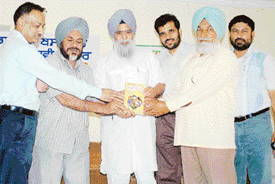Ajmer Singh Aulakh
Ajmer Singh aulekh has published three collections of short plays. Arbad Narbad Dhundakar (Aeons and the Nebula, 1978) includes five such plays. The title is taken from a line of Guru Nanak in the Guru Grantha in which he has given cosmology on the lines of ancient Indian texts. The first, the title play, extends over two acts. Of its five characters, Ranjha and Mirza are heroes of love legends of medieval Punjab, Majnu of medieval Arabia and Farhad of medieval Iran. The fifth, Indra, is the well-known God of Indian mythology who violated Gautam Rishi's wife Ahalya by assuming the Rishi's form. The tragic end of these lovers is attributed to the social prejudices of their times. In the second act, he connects their plight to economic problems in the light of Marxist philosophy.
The second play, Begane Bohar di Chhan (Shade of the Alien Tree (1983),is Aulakh's most popular play. It presents the situation of a peasant-tenant Gajjan Singh, who is surrounded by protests on all sides by the members of his joint family. The younger brother and his wife want to devide the small tenanted holding, after which division of life will become ever more difficult for them. Old Bishni, whose husband and son have been killed in a feud, represents the Diogenic aspect of life. Kashi Ram is the moneylender who feeds as a vvAtuie on these carcases, Pitu, another poor peasant, provides a running commentary on the situation with grim humour.
Ik Ramayan Hor (One More Ramayana) is a transference of the legendary situation of Lord Rama, his wife Sita and brother Lachhaman to the house of a small peasant (Ram) who asks his wife Sita to keep his younger brother (Lachhu) in good humour so that he may not marry and ask for division of their petty holding. Sita, in contrast with her namesake of the epic, agrees to bestow her favours on her brother-in-law.
In Bhath Kherian da Rahina (Living in a Furnace), Nirmal, son of poor peasant,cannot go to college for higher studies and has to join the police force as a constable. The superintendent of police wants him to shoot a captured Naxalite, Darshan, who had been a class-fellow of his. He makes feeble protests but has in the end to obey his superior.
Sukki Kukh (The Dry Womb) consists of three scenes, Dhanno, the barren women,is advised by a so-called sadhu to kill a neighbour's child as sacrifice to the God. Dhanno would have committed this crime had the child's mother not come on the scene and dragged her child away.
The third collection entitled Anhe Nishanchi (Blind-shooters) contains five one-act plays. Behkda Roh (Flaming Rage) contains four scenes in which Bhagat the tenant and Madho, his share-cropper, find their situation so unbearable that they decide to kill the landlord and the moneylender. The play ends when these two appear armed with a lathi and hatchet, determined to kill their exploiters.
In the second play, Anhe Nishanchi, members of the exploiting classes are shown engineering communal killings in 1947. The third play, Sidha Rah Vinga Banda (The Straight Path and the Crooked Man), presents criticism of civil officials perversely abusing their powers.
Rahgir (Wayfarer) has three characters, an old man, a young girl and a wayfarer, symbolising three generations toiling under difficult conditions for the attainment of new ideals.
Brahmabhoj (Divine Feast) is a new version of the well-known legend connected with Guru Nanak Dev. A child rejects the delicacies of a rich man as blood-soaked and eats with relish the rye loaf of a poor household which he describes as sweet as milk.

